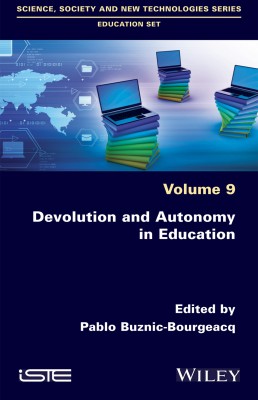
Allowing learners to take some responsibility may seem obvious yet what is actually afforded to them, and how this process works, remains difficult to grasp. It is therefore essential to study the real objects of devolution and the roles played by the subjects involved.
Devolution and Autonomy in Education questions the concept of devolution, introduced into the field of education in the 1980s from disciplinary didactics, and described in Guy Brousseau’s Theory of Didactical Situations in Mathematics as: the “act by which the teacher makes the student take responsibility for a learning situation (adidactic) or problem and accepts the consequences of this transfer”. The book revisits this concept through a variety of subject areas (mathematics, French, physical education, life sciences, digital learning, play) and educational domains (teaching, training, facilitation). Using these intersecting perspectives, this book also examines the purpose and timeline of the core process for thinking about autonomy and empowerment in education.
Part 1. Didactics and Devolution: Specificities of Disciplines and Audiences
1. Potential of Peer-to-Peer Research and Proof Situations in Mathematics Classes and Devolutions, Jean-Philippe Georget.
2. Some Comparative Analysis of Mathematics and Experimental Science, Faouzia Kalali.
3. Double Devolution of Action in Physical Education, Benjamin Delattre.
4. Information and Communication Technology (ICT) in Education: An Issue that is Still Relevant Today, Hervé Daguet.
5. Reflection on the Devolution of Knowledge in French Kindergarten Teaching: Worksheets, Sophie Briquet-Duhazé.
6. Between a Willingness to Adapt and Real Devolution, what Material Works for which Form of Learning? A Case Study in a Localized Unit for Inclusive Education (Ulis), Laurence Leroyer.
Part 2. Devolution Beyond Disciplinary Didactics
8. Devolution and Problematization Among Trainee School Teachers: What Kind of Appropriation is There?, Florian Ouitre.
9. Professional Writing as a Complex Space in Devolution, Bruno Hubert.
10. The Subject Area: Devolving One’s Own Trials, Pablo Buznic-Bourgeacq.
11. A Game to Play and a Game Played: A Devolution “UnderInfluences”, Vanessa Desvages-Vasselin.
Pablo Buznic-Bourgeacq is a researcher at CIRNEF and a trainer at INSPE Normandie Caen, both of which are part of Normandie Université, France. His work is based on an interdisciplinary approach within the humanities and is inspired by the educational sciences; the didactic and clinical fields being particular areas of interest.